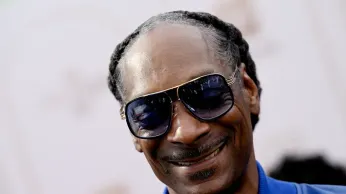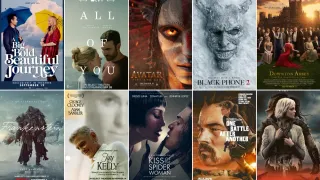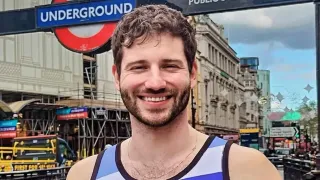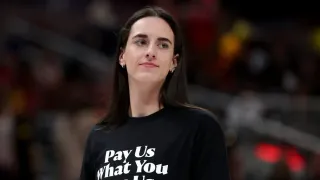
3 hours ago
Snoop Dogg Makes Troubling Comments About Queer Representation in Children’s Media
READ TIME: 3 MIN.
Snoop Dogg, one of hip-hop’s most recognized figures, has come under fire after voicing his discomfort with LGBTQ+ representation in children’s movies during a recent appearance on the “It’s Giving” podcast, hosted by Sarah Fontenot.
Referencing a personal experience attending a screening of Pixar’s 2022 animated film Lightyear with his grandson, Snoop Dogg recounted being challenged by his grandson’s questions about the depiction of a same-sex couple raising a child in the film .
The rapper shared his sense of discomfort: “Why my grandson in the middle of the movie like ‘Papa Snoop, how she have a baby with a woman? She a woman.’ Oh s---, I didn’t come in for this s---. I just came to watch the g------ movie. Hey man, watch the movie. They just said she and she had a baby. They both women. How does she have a baby? S---. The movie ain’t over with… I’m scared to go to the movies. Like y’all throwing me in the middle of s--- that I don’t have an answer for,” he said .
Snoop Dogg’s comments, which were widely circulated online, have drawn strong reactions from LGBTQ+ advocacy groups, entertainment industry figures, and international audiences. Critics argue that the rapper’s remarks reinforce stigmatizing attitudes and miss an important opportunity to discuss diversity and family structures with young people .
Outrage has been particularly pronounced in Australia, where Snoop Dogg is scheduled to perform at the Australian Football League (AFL) Grand Final. In the wake of his comments, and following the AFL’s recent sanctioning of player Izak Rankine over a homophobic slur, calls have intensified for event organizers to reconsider Snoop Dogg’s participation.
Australian politicians, including Shadow Immigration Minister Paul Scarr, have weighed in, stating, “If you’re going to set certain standards, then people are going to raise questions... if you deviate those standards on a case-by-case basis,” highlighting the tensions between public accountability and celebrity influence .
Advocacy organizations emphasize that representation of LGBTQ+ people in children’s media is not only reflective of real-world diversity, but also essential for fostering empathy, understanding, and acceptance from a young age. Such representation, they argue, helps all children—regardless of their family structure or identity—see themselves reflected in the stories they consume and challenges outdated stereotypes that have long dominated mainstream media .
The issue of LGBTQ+ characters in children’s media is far from new, and Snoop Dogg’s comments have reignited a long-standing debate. Many LGBTQ+ advocates argue that children’s questions about diverse families present valuable teaching moments for parents and caregivers, rather than scenarios to be avoided.
“When children see families like theirs onscreen, or families different from their own, it validates their experiences and offers a foundation for meaningful conversations about love, respect, and inclusion,” said a spokesperson for GLAAD, the LGBTQ+ media advocacy organization .
Film industry figures, including actors and writers involved in projects like Lightyear, have also voiced support for inclusion. Chris Evans, who voiced Buzz Lightyear, previously commented that criticism of LGBTQ+ storylines reflects “fear and ignorance,” and that progress is inevitable: “There’s always going to be people who are afraid and unaware and trying to hold on to what was before. But those people die off like dinosaurs. I think the goal is to pay them no mind, march forward, and embrace the growth that makes us human” .
The controversy surrounding Snoop Dogg’s remarks has sparked conversations far beyond the United States, highlighting the global significance of media representation. In countries where LGBTQ+ rights and visibility remain contested, the inclusion of diverse families in mainstream children’s entertainment can serve as both a beacon of progress and a flashpoint for cultural debates.
Despite opposition, major studios like Disney and Pixar have signaled their commitment to inclusive storytelling. This stance is supported by a growing body of research indicating that inclusive media benefits all children by promoting empathy, reducing prejudice, and reflecting the diversity of real-world families .
As the entertainment industry continues to evolve, LGBTQ+ advocates stress the need for ongoing dialogue and education. “Media is one of the first places children learn about the world,” said a spokesperson for the Trevor Project, a leading LGBTQ+ youth advocacy organization. “When we see people like ourselves in the stories we love, it sends the message that everyone belongs” .
Snoop Dogg has not yet responded publicly to the backlash or clarified his views following the controversy . As public conversations continue, the incident underscores the enduring importance of representation in children’s media—not only for LGBTQ+ families, but for all who believe in the value of inclusion and acceptance.






